Lahui Ako
Lahui Ako is an author and a blogger. He fully supports the promotion of healthy living, while preserving the legacy of all the Nameless Warriors of the PIB and the PIR who have fought to defend our freedom, LEST WE FORGET!
Where there's a way, there's a will: Changing the Motuan age-old "Lahi-Dairi" custom to suit 21st Century requirements and family re-configuration.
My dad passed away in the earlier hours of Saturday, 8 December, 2018, surrounded by his love ones, at our residence at Nese Heights, Hanuabada village, Port Moresby. As his father had done to him about 36 years ago, so he did to me: He passed on, while both I (and my younger brother, who is employed with OTML), were away on duty travel in the service of our great nation.
As my father’s eldest son, the mantle of responsibility to bury him fell on my untried shoulders, or so me and my brother thought. We both felt that it was our duty to see that his transition from this life into the next, was done according to the ancient Motuan tradition. However, by taking on this mantle of leadership, and managing it all the way until his “lahi-dairi”, I was deemed by my father’s living male siblings as having “usurped” their rights to dad’s final walk into infinity.
They may have been right; while again, they may have been wrong. I leave this to the elders of the Motu-Koitabuan tribes to determine for themselves.
This being said, the day-to-day living of my extended family, particularly, the circumstances surrounding the relationship between the siblings since dad’s birth in wartime Manu-manu, played a very critical role in my actions, which I hope, can now pave the way for the modernization of our Motu-Koitabuan, but predominantly, Motuan culture in the 21st century.
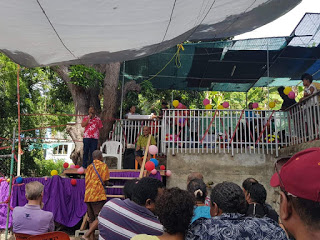
Background
Dad was born the eldest of 14 siblings: four male, and ten female. Of these, six, including dad, have passed on. Being the eldest, dad, had an important hand in their upbringing, acting as a surrogate mother to them, as they were all growing up. Most of these siblings were born less than two years of each other. Grandfather Lahui Ako was a very busy man, it would seem. My grandfather was a medical orderlie during WW2, and after their return with the rest of the Hanuabada evacuees from Manumanu, grandfather was employed with the Port Moresby General Hospital until his retirement in the late 1970s. The daily upkeep of feeding this huge family, obviously fell on dad’s young shoulders. By the time he was six, he was already spearfishing in the reefs to supplement what grandfather would bring from work. This became harder when grandfather bundled him off to the LMS school on Metoreia because this meant that when school ended in the early afternoons, he went to the beaches to look for shellfish, or out to the reefs to look for fish.
When he left Port Moresby in 1972 to the Rarongo Theological College in the East New Britain Province to pursue his inner most call, his calling took him from there to Adelaide, South Australia, for his practical, then to Siwai, now in the AROB where he got ordained as a fully-fledged United Church Minister for Religion, and then in 1976 into the new PNGDF, where he took over as one of the first four (4) chaplains to localize the positions from the chaplains of the ADF.
In 1988, dad was finally posted to Port Moresby, nearly 16 years after leaving home, to the Taurama Barracks, where in 1991, he was replaced by Chaplain Patrick Gau (of the Caribou crash fame). Dad then spent the next few years as Director of Lifeline, before moving across the hedges to the Waigani United Church as its in-house Minister. From there he became, what they call, the Mission Secretary to the Bishop of the United Church Urban Region. He held this job until the final three years of his career when he was appointed as the Superintendent Minister of the United Church Poreporena Circuit, where he retired from active ministry in 2008.
Sometimes in 2005, dad had a minor stroke. With the care of his good cousin, Prof Dr Isi Kevau, he pulled through. He would remain as one of Prof Kevau’s patients until his passing. From there on, dad had a heart issue, and he would visit the Heart Foundation on a regular basis under mum’s loving company. Over the next decade or so, Dad would spend a few days at the POMGEN on three occasions. On these occasions his siblings rushed to visit him. Regrettably, such enthusiasm was never repeated when he was sickly and at his home. In the final three years of his life, his siblings only visited him twice. The second time was at his deathbed.
Reconfiguration of traditional obligations
Traditional obligations are successfully carried out if one is adequately resources. These assistance, in cash or kind, are repaid when similar occasions come up again. When dad passed on, while family assistance was there, financial assistance from friends and work colleagues poured in to support us during our time of grief. The outpour of such assistance was such that it had to be managed properly to ensure that all prescribed activities in the traditional Motuan funeral process were adequately catered for. These would include expenses for the:
1. Funeral home;
2. Overnight before burial;
3. Funeral service program;
4. Burial costs;
5. Refreshments after the Funeral service and burial;
6. General living expenses for those staying at the Gara Rumana (Hauskrai);
7. Lahi-dairi ceremony; and,
8. Farewell kaikai for those living at the gara rumana.
The traditional Motuan custom decrees that the responsibilities of the hauskrai goes to dad’s male siblings. From the outset when dad closed his eyes forever, my siblings had informed dad’s two brothers that “all decisions were to be made by Lahui when he returned from his duty travel.” This, they acknowledged. Whether or not wholeheartedly, we will not know. (All would later be revealed during the Lahi-dairi).
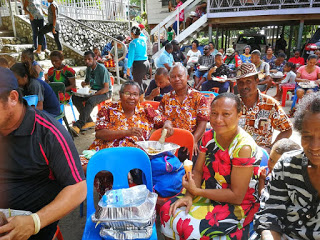
By then, it was becoming very obvious that dad’s siblings, both male and female, had other motives, which were not in the best interest of dad’s immediate family, nor those of the whole extended family, including my mum’s side. I was not going to allow that to happen.
Dad had also left specific instructions, in the event he passed on before mum, which had to be carried out and honoured. Sibling or not, his wishes were to be carried out. Paramount on his wishes was: there was to be no “Hekwada,” which is an age-old obligation by the family of the deceased to formally release the living spouse back into normalcy. Dad’s siblings had hinted their intentions to carry out this obligation. I wanted to find middle ground on this issue.
So, in order to manage these obligations, some unpopular decisions had to be made. I made those in the following manner:
Funeral Home cost
Traditionally: To be shared equally by all parties, (unless someone volunteers to cater for this cost due to past obligations)
- The cost of funeral home was split three ways: Dad’s siblings, mum’s siblings, and me and my siblings. These equation went off without any hitch.
Overnight costs and refreshments
Traditionally: To be shared by all parties. This will also include catering for the refreshments during the overnight for the mourners, etc.
- costs were covered by my family;
- Catering and serving was provided by my mum’s family;
Funeral Service program and refreshment costs
Traditionally: To be done by the immediate family, upon advice from dad’s male siblings. Refreshment costs to be covered by all parties.
- The funeral service program was done by my family;
- Refreshment costs were covered by my family;
Burial and related costs
Traditionally: The burial cost is covered equally by all parties, with dad’s siblings playing a leading role. The burial program and site is the responsibility of dad’s male siblings.
- The burial cost and site was covered by my family.
General living expenses of the hauskrai
Traditionally: The cost is covered equally by all parties.
- This cost was covered by my family.
Lahi-Dairi ceremony
Traditionally: This cost is covered equally by all the parties.
- This cost was covered by my family
Breaking up feast at the Gara Rumana
Traditionally: this cost is covered equally by all the parties
- This cost was covered by my family
In a nutshell, the generosity of my family, our friends, and work colleagues, ensured that we successfully concluded dad’s traditional funeral rites according to traditional protocol, albeit with a modern twist to it, due to circumstances beyond our control.
Circumstances that can prompt one to circumnavigate standing traditional protocol to achieve the same result
For reasons I, at this point in time, cannot comprehend, is the attitude of dad’s siblings these past few weeks after we laid dad to rest.
Firstly, and most importantly, none of them stayed at the Gara Rumana right up to dad’s Lahi-dairi, nor did any of them come to visit us or mum, if only to pay their respects.
Secondly, they never contributed to the upkeep of the Gara rumana, nor to the Lahi-dairi ceremony;
Thirdly, dad had a burial slot at Badihagwa, of which his specific instruction was to be buried there when his time came (right next to his mother). For some reason, I suspect that one of dad’s brothers (don’t know which), allowed a nephew to bury his dead there. During the family meeting we had in the days leading up to the funeral, of the brothers, even suggested “digging them up to make space for dad.” I gave them a stern “NO.” I brought dad to be with us at Nese Height.
Fourthly, after confirming dad’s final resting place, and with a little more than 48-hours to go before the scheduled funeral service and burial, we went to work preparing his grave (or tomb). There were 27 boys of various ages from 15-30 who came to assist build this tomb. None of them were from my father’s side.
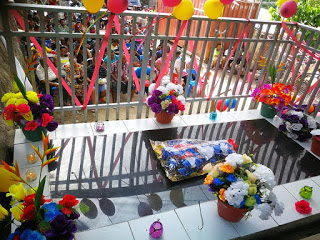
Fifth, during the meeting we convened at the Gara Rumana to plan the Lahi-Dairi, they made me wait from 1900 right up to 2230. When I send messengers to inform them that we coldnt wait any longer, dad’s brothers sent message to we could go and meet and to give them the outcome. Because of their inability to consult with me on whether or not they were going to go ahead with the “Hekwada”, I was in the dark as to their intentions on this issue. So, I sent a message to them informing them that there would be no “Hekwada” as per dad’s wishes. In saying so, I instructed the messenger to invite them to participate in the Lahi Dairi ceremony.
Sixth, dad’s siblings didn’t contribute to the lahi-dairi ceremony. During dad’s hauskrai, we had two family meetings. (The third, they made me wait until informing me of their non attendance four hours later). During the second meeting, when we started planning for the Lahi-dairi, I informed them “because the families had assisted us greatly during dad’s funeral home expenses, they would be required to contribute ten per cent each of the total cost.” This meant, ten per cent from my dad’s side, and ten per cent from my mum’s side; that me and my family would cover 80 per cent of the costs. They agreed. So, their lack of contributing towards this overall expense was not going to deter me and by siblings from carrying out dad’s final traditional funeral ceremony.
Seventh, I started chairing the family meetings. The spirit of democracy is alive and well in the Motuan traditional system. During the first meeting, when dad’s two brothers tried fervently to outdo themselves in their chairmanship of this inaugural funeral arrangements meeting, I realized that we were not going to get anywhere with this practice. For the benefit of the whole clan, they both had to be steered in the right direction.
So, from the second meeting onwards, I took over the chairmanship, as befitting my right as the eldest son of my father. I informed them that because they were now both my elders, I would crave their advice; but that the final decision of any plan, would come from me. This was because we were working from an Op Plan I had drawn up. I was not going to let any arrangement I was organizing go “down south” if only to allow traditional egos to compete for supremacy. I then turned to my uncles, mum’s brothers, for guidance through this quagmire. They were more than happy to oblige, while they stayed in the background as advisors.
Eight, mum was formally released from her traditional mourning period, by two of dad’s cousin sisters. As I mentioned earlier, dad’s siblings were never with us, particularly mum, at the Gara Rumana. But dad’s cousin sisters were. Aunties Margaret Mackinlay and Mary Rei were with mum from the time dad passed on, until the Lahi-Dairi. So, to them, went the honor and task of “releasing mum from her mourning period. They did so with much respect and gusto. How they both loved dad. Over the years up to his passing, they would both visit my parents every now and then. Dad’s siblings hardly visited Nese Heights. But not these two ladies.
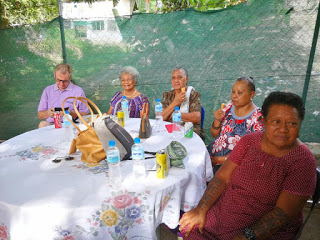
Ninth, I forbade United Church ministers from meeting my dad’s casket at the entrance of the church, and carrying him into the church for the simple reason that dad, despite his standing in the United Church, was already retired at the time of his passing. The only members of the clergy who came to visit him after his retirement were the deacons of our clan. It was only right that the deacons concluded his funeral rights at home during the overnighting of dad at Nese Heights. So, the deacons did the 6pm prayers, the 12 midnight prayers, the 6am prayers (the following day), and the final prayer at home before dad’s casket was carried to the church for his funeral service. The deacons were again, on hand to receive dad’s casket from the pallbearers to his final entry into Church.
A couple of standing United Church practices must now change for the better. First and foremost, is the custom of ministers waiting at the bottom of the church entrance to receive the body of their colleague and carry him into the church. As I questioned myself, so too should everyone question this tradition: Are these ministers there out of goodwill and sorrow to do this role, or are they there to “get the task done and over with” so that they can go around informing anyone who may care to listen that they were there at so and so’s funeral service. I remember very well when uncle and retired Bishop Nou Oru passed on. During his funeral service, I happened to walk past a group of ministers in their sulus and white. They were all milling around, waiting anxiously for the casket to be brought to church “so that they could go home to their chores.” This was not showing respect to the dead.
When dad became bedridden in the final few months before his passing, I had two nephews, children of my cousin sisters from my mother’s side, staying with me at Nese Heights. These two young men, without waiting to see whether or not what they were doing was right or wrong traditionally, continued to literally carry dad to the bathroom, or downstairs to the lounge and outside to the deck, to sit in the sun, or watch the sun set, etc.
Finally, the Lahi Dairi ceremony. In the Motuan language, “Lahi” means fire in English, while “Dairi” in this context, means to “douse.” So, Lahi-Dairi means to “douse the fire.” During the old days, as soon as the Gara rumana becomes official, a fire was lit; and it stayed lit; all the cooking was done on it. It stayed lit to show respect to the departed, and to give warmth to the living during this time of grief. On the appointed day of the Lahi-Dairi ceremony, the living spouse was released from the official mourning period with the dousing of this fire, thereby, ending mourning.
There are two forms of celebrating this ceremony.
One would be to bring in to slaughter, pigs, wallabies, cows, and garden food such as bananas, kaukau, yams, taro, etc. These are then allocated to everyone who has contributed in whatever way, to the Gara Rumana. The numbers go into the hundreds. The financial constraints of the day disallowed me from going down this path. Everyone who is remotely connected to the two families are mandated to attend.
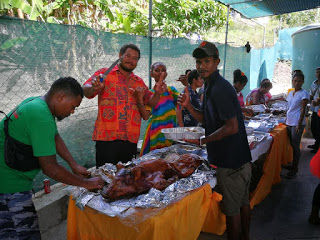
The other one is the exchange of dishes. Both dad’s and mum’s sides would cook dishes of food. These would then be brought to the event, and exchanged. Again, I was unable to go along with this practice for the sole reason that there would be imbalances in the quality and quantity of food cooked, and could cause embarrassment to me and my family. This option was a no goer from the very beginning due to the lack of cooperation from dad’s siblings. Most importantly, because of the nature of the exchange, no one sits together to eat. So what is the point of a lahi-dairi if the grieving families cannot sit down together to share a meal?
I decided to merge these two practices together and came up with the following plan, which my family implemented to the letter for a successful outcome.
Firstly, I sent out invites to everyone who had assisted us in cash, kind or person either during the overnighter, the funeral service, or during our time of bereavement. This immediately deterred those “free-riders” from attending this ceremony. Over 170 Invitations were sent out. Of these 150 attended; the rest sent regrets. Everyone who was invited took part in our feast.
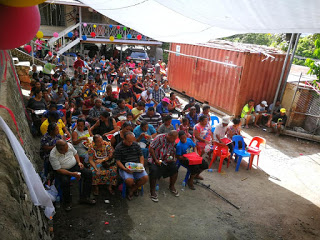
Secondly, my family organized a “sit-down” meal for all our guests who attended this ceremony. We served them. This was to portray our appreciations and thanks for their contributions towards our dead.
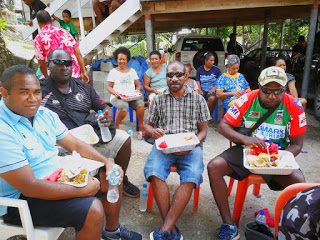
Thirdly, we made 70 dishes of food, which were distributed to those of our guests who had went beyond the call of tradition and custom, to support us during dad’s death. They were honoured with dishes of food, in addition to sitting at our table for the feast.
During the hauskrai period, mum’s brother, gave me and my family, a gift of a pig. This we gave, during this ceremony to aunty Margaret Mackinlay and aunty Mary Rei for their role in looking after mum during this time. We were already looking after a pig from a past brideprice ceremony. This pig, together with another we bought from one of the villages up the Magi Highway, were also presented with their accompanying pigs to – the clan deacons, for the role they played in officiating at my dad’s funeral arrangements with the Church; and, the remaining one, albeit, the largest, to the 27 boys who built dad’s final resting place. They all also got dishes of food.
Finally, my two nephews. Because of the intimate care given to dad, two of my three sisters, cut the choicest parts of bacon, and wiped their hands, faces, and arms with it to “signify our deep appreciations for the care they gave to dad, and to wipe away all the sadness and sorrow dad gave to them”. Bacon/pork, are only eaten during feasts in the Motuan culture. They also got the choices pieces of pork and dishes of food.
The Lahi-dairi feast was made up entirely of roast pork, chicken, fried noodles, and mumu ordered from a Bougainvillean (AROB) SME I met during the APEC Closing Senior Officials meeting at the ICC. She provided a sumptuous buffet fit for king. In addition to the mumu, she also provided tama-tama.
I am told the following day that everyone went away happy.
So passed my dad into infinity. And with his passing, I also hoped that I had changed the mindset of my people so that they change along with the changing environment of times.
This is the Welcome speech I gave during the Lahi-Dairi ceremony:
Good afternoon all.
On behalf of my family, in particular my mum Vabu Kari Ako, my wife Daera and children, my brother Nou Ako, his wife Vagi and their children, my sisters Lolar Ovia, and Henao Rauka and their husbands Kone Ovia and Peter Rauka and their children, and Parasanya Nou and her family, I would like to welcome you all to dad’s “Lahi dairi” ceremony.
As this is a traditional ceremony, I would like to acknowledge the memories of my forefathers, including dad, who has gone now to join. Your unseen presence is welcome on this occasion.
In saying, so, I would like to take this time to humbly express our most sincere gratitude and heartfelt appreciations to everyone gathered here today, as well as many others who are unable to attend due to other commitments, for your presence, and assistance, in cash and kind, during our time of bereavement: from the time dad closed his eyes forever in the early hours of Saturday, 8 December, 2018 right up to today.
Without your selflessness, love, friendship, and respects, we would not have been able to pull through during our hour of darkness. The love and warmth you all portrayed towards me and my family has given us the strength to rebuild our lives again after dad’s departure.
In the olden days, as soon as the Gara rumana commenced, a fire was lit in the hauskrai and all cooking was done over that fire; it was not allowed to die but was kept going right up to this occasion, when it was formally doused. As such the Motuan word for Lahi dairi, which literally means, “dousing the fire.”
We are all gathered here today, to do just that. Douse this fire that has been burning ever since we buried dad on Friday, 14 December, 2018.
The “gara rumana” or what is popularly called today in pidgin, the “hauskrai” in our Motuan culture, is steeped in tradition. Most of you would have looked on with confusion with some of the actions my family took to honor our late father’s wishes simply because our dad instructed us to do so when he was with us.
Dad was always a realist. He didn’t agree wholeheartedly with those Motuan traditional practices that ate deeply into the finances and pockets of family members unnecessarily; and during our discussions, he would always remind us that “if he passed on, there would not be a Gara rumana (or hauskrai), no lahi dairi, and even no headstone too.
But dad was a very fair man too: and knowing the time, effort, and love you all have poured on us, he would have instructed us to honour you all too.
Dad retired from active service as a Religious Minister in 2008. He went to meet his Maker as a “Retired” Haroro Tauna or Talatala. For that reason alone, we opted to allow our clan deacons to complete the final religious rites at his residence. Because from the time of his retirement until his passing, he had place himself under the care of our clan deacons.
For that reason I must pay my respects to the deacons of our clan, who went out of their way to make dad’s funeral rites possible.
Dad was never mourned at the clan, nor was his casket brought to the house of his birth at Gunina-laurina for the final rites. The reason is simple.
Dad started building this house in 1977. He always told us that our clan, the Gunina-laurina clan, will always be our heritage. But Nese Heights, and the house he built for us, his immediate family is our residence; and so, at this residence, our little family will carry out all its traditional obligations, from brideprice and other festivities, to other activities such as this. As such, he left strict instructions that when he left for Heaven, all the funeral arrangements will be done and completed here in his residence; and not at the clan. To comply with his wishes, we did exactly that.
In the last five years, as dad was preparing himself to meet his Maker, he had already allocated himself a burial slot next to his beloved mother at the Badihagwa cemetery. Unfortunately, a few years ago, during a visit there, he discovered that this slot had been taken up by another family member without his knowledge. He was really pissed off. But being a humble person he was, he let this subject go. That is why he lies here.
So, I commend and pay my respects to those 27 young men, with the guidance of Mr Tamasi Charles, who works 48-hours straight on to build this tomb where he now rests. Unfortunately, for some reason, none of my cousin brothers from my father’s side are part of this group.
Every first or second day of the New Year, dad and mum would always sit quietly together, and look at all the achievements and heartaches of the past year, and then put the new year’s hurdles and challenges into God’s hands. On 2 January, 2018, they both sat and planned as usual. During that time, they both agreed that in the event one of them passed on first, the following two (2) things will not happen:
Firstly, there would be no Headstone (because it would incur more costs to the living);
Secondly, and most important, there will be no “Hekwada”, again because it would incur more cost to the living.
The Motuan practice of Hekwada is simply the bringing of gifts of food by the deceased family to his or her partner’s family. During that process (which will be happening upstairs in the next few moments), dad’s siblings will remove the mourning clothes from mum’s body, and cloth her with new colourful cloths, give her betelnut to chew, and lead her out into the open, thereby, formerly, signalling the end of her mourning period.
Unfortunately, for reasons which I am not privy to, dad’s siblings have not been part of this Gara Rumana since our family meeting on Sunday, 16 December, 2018. They have not visited mum or this house, right up to now.
While I am disappointed with their actions, I must also respect their wishes, however, misguided these are, to ensure that dad’s final funeral activity, is concluded successfully, and to ensure that the duty of honouring you all, for you time and commitment to our gara rumana, is accorded.
While there will be no Hekwada, in compliance with dad’s wishes, his cousin sisters, Aunty Margaret Mackinlay, and aunty Mary Ray, will do the honours of releasing mum from her mourning obligations. The MC will narrate the proceedings that is now happening upstairs as it cannot be done in the open.
I therefore, thank you all for coming.
For that I would like to express our most sincere appreciations and gratitude to the following persons for their time, energy and resources during this time:
Ambassador Ivan Pomaleu (PNG APEC Ambassador), Ambassador Max Rai (PNG Permanent Rep to the UN in New York), Mdm Julie Wapo, Mr Frank Aisi, Mr Steven Collin, Mr Robin Suang, Mr Tyson Boboro, Mr Bruce Mackinlay, Mr Vagi Gairo, Dr Boe Lahui Ako, Ms Ingrid Kuman, Ms Hera Kevau, Ms Marie Eorage, Mr Allan Guo, Mr Stephen Vele, Mr Isikeli Taureka, Mr Frank Mizigi (Indonesia), the late Arua Rarua family, Ms Bagara Peter (Belgium), Mr Hans Maven, Mr Turai Elemi, Colonel Ivan Timo. And Ms Mary White and family (Townsville, Australia).
I would also like to sincerely thank my mother’s siblings: the late Arua Udu Nou family, late Buruka Nou family, Mr Frank Onu Nou family, Mr Lou Nou family, Ms Margaret Koita Nou family for their perseverance, love, respect and commitment to us during this time. The same also goes to the late Vagi Lou family.
In the absence of my father’s immediate siblings, his cousins from his mother henao Mou’s side, namely: the Ray Mou Family, Lohia Mou family, Sereva Mou Family, and Kedea Mou (Rocca) family.
I would also like to thank work colleagues from the PNG APEC Secretariat, Pacific MMI, and the Environment Department of OTML;
I would also like to acknowledge the time and effort put in by Dr Boe Lahui, Reverend Oika Gabutu, Mr Bruce Mackinlay, Ambassador Peter Ilau, and Prof Sir Isi Kevau for honouring dad with your heartfelt thoughts in the tributes you gave for him during his funeral service. Thank you very much for that timeless gesture.
And my lifelong friends from the Firstainmangiis, and esteemed mates from the Port Moresby Fisspotts. Thank you all for your contributions and your presence here today. You all cannot imagine what this means to me and my family.
I would also like to pay my respects to the following ladies who left their families these past two weeks to come and stay with mum: Kaka Gari Udu, aunty Momo Hoeke, aunty Mary Ray, and aunty Margaret Makinlay; not forgetting her only sister, aunty Margaret Koita Nou. You all eased mum’s heartaches.
I would also like to pay my respects to dad’s only namesake, Mr Ray Nou from Pari village. Your presence here gives us great honor.
Lastly, everyone who has been a part of our sorrow. Thank you all from the bottom of our hearts.
May God continue to bless you all and may He add and multiply everything the blessings you have blessed us with.